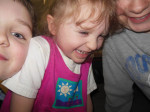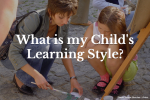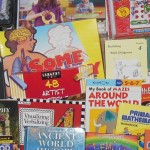Asking questions can be a powerful method for helping a child learn how to think and process ideas. Questions associated with school are often questions that show you have read and understood the material covered. However, those types of questions often involve recall rather than thinking processes. I ask my kids questions all the time in our conversations. I love hearing their thoughts and ideas as they ponder different questions. It isn’t something that needs to be reserved for school-aged kids either. It can start quite young.
Back before kids I worked full-time as a Speech-Language Pathologist and one of my favorite groups to work with was young children who hadn’t started talking yet. One of the strategies I used for these young children who were typically between the ages of 18 months and 36 months was playing dumb. Playing dumb was a highly effective method for young children to share more of their thoughts and ideas as they try to get me to understand. For instance, if my daughter wanted to show me a toy, she would point to it and even though I could see it, I would occasionally play dumb and look everywhere else except where the toy was. My little girl would then tell me more information (verbally or with gestures) to help me find the toy. This is typically quite enjoyable for the young child too. Little kids are usually the ones on the receiving end of this, so it is often perceived as fun to be the one trying to get an adult to understand something that is quite obvious. When my daughter started to learn her letters, this was an effective way for her to show me that she knew her letters. I would look at all the magnetic letters on the fridge and wonder where the letter E was. I’d wonder aloud and sit there puzzled. When my daughter found it, she eagerly pointed it out to me. I’ve found that “playing dumb” is a great tool towards promoting thinking and communicating.
As a child grows and is more verbal, questions not only help a child think through ideas, but they also help you understand your child’s thinking a little better. Questions in our household are not a school-thing, but a way of life. It will also lead to your child asking questions too. As your child grows and learns to think through ideas, the questions can become more complex. The questions don’t often have correct answers, but are typically open-ended. Here are some example questions that you might hear in our home:
- Why?
- How do you know that?
- Hey, look at that. What do you think that means?
- Why do you think they did that?
- How do you think they did that?
- How do you know that?
- What does _______(insert word you heard child use for the first time) mean?
- I think ___________. What do you think?
- I wonder why ____________. What do you think?
Also, during our school day it isn’t unusual for a child to ask me a question about something being studied. Often my first response to the question is a question. So if my son asks me what a word means I might ask him what he thinks it means. After he answers, I will then answer his question. Sometimes my child already knows the answer, but isn’t sure and other times their answers show me that they have a general idea but need more information.
When a child answers an open-ended question with an “I don’t know”, I try to probe a little deeper to help them learn to think through the question. Or I might answer the question by pondering the different possibilities aloud. Here is a for instance.
Situation: Children and I are sitting in the car waiting for their dad to come out of the grocery store. We saw a car pull up and a person go into the store and come back to their car a short time later.
Question: Hey, that man came after us and he is already leaving. Why do you think he finished first?
Child answered: I don’t know.
Probing/thinking aloud: “Hmmm, maybe he only had one thing to get. Or maybe he was in a faster line. Or maybe Daddy decided to get something else. Or maybe….. Why do you think he was done first?”
Child answers with one of my ideas, sometimes offering new ideas.
Questions and probing can get more and more complex as your child grows. Asking open ended questions that don’t have right or wrong answers will help your child learn to think critically. Not only that, but it will help you better understand your child.
What are some open-ended questions that you enjoy asking?








What made you think of that? My six-year-old son makes a lot of random comments and observations, which I love but don’t always follow unless I ask. From his answers, I always learn exactly what’s on his mind and I understand a bit better how he thinks. So fun to watch him make connections, and open-ended questions can facilitate that.